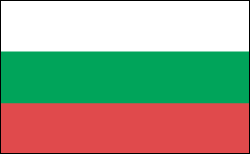
Geography
Bulgaria shares borders with Serbia, Macedonia, Romania, Greece, and Turkey. Two mountain ranges and two great valleys mark the topography of Bulgaria, a country the size of Tennessee and situated on the Black Sea. The Maritsa is Bulgaria's principal river, and the Danube also flows through the country.
Government
Parliamentary democracy.
History
The Thracians lived in what is now known as Bulgaria from about 3500 B.C. They were incorporated into the Roman Empire by the first century A.D. At the decline of the empire, the Goths, Huns, Bulgars, and Avars invaded. The Bulgars, who crossed the Danube from the north in 679, took control of the region. Although the country bears the name of the Bulgars, the Bulgar language and culture died out, replaced by a Slavic language, writing, and religion. In 865, Boris I adopted Orthodox Christianity. The Bulgars twice conquered most of the Balkan peninsula between 893 and 1280. But in 1396 they were invaded by the Ottoman Empire, which made Bulgaria a Turkish province until 1878. Ottoman rule was harsh and inescapable, given Bulgaria's proximity to its oppressor. In 1878, Russia forced Turkey to give Bulgaria its independence after the Russo-Turkish War (1877–1878). But the European powers, fearing Russia's and Bulgaria's dominance in the Balkans, intervened at the Congress of Berlin (1878), limiting Bulgaria's territory and fashioning it into a small principality ruled by Alexander of Battenburg, the nephew of the Russian czar.
Alexander was succeeded in 1887 by Prince Ferdinand of Saxe-Coburg-Gotha, who declared a kingdom independent of the Ottoman Empire on Oct. 5, 1908. In the First Balkan War (1912–1913), Bulgaria and the other members of the Balkan League fought against Turkey to regain Balkan territory. Angered by the small portion of Macedonia it received after the battle—it considered Macedonia an integral part of Bulgaria—the country instigated the Second Balkan War (June–Aug. 1913) against Turkey as well as its former allies. Bulgaria lost the war and all the territory it had gained in the First Balkan War. Bulgaria joined Germany in World War I in the hope of again gaining Macedonia. After this second failure, Ferdinand abdicated in favor of his son in 1918. Boris III squandered Bulgaria's resources and assumed dictatorial powers in 1934–1935. Bulgaria fought on the side of the Nazis in World War II, but after Russia declared war on Bulgaria on Sept. 5, 1944, Bulgaria switched sides. Three days later, on Sept. 9, 1944, a Communist coalition took control of the country and set up a government under Kimon Georgiev.
A Soviet-style People's Republic was established in 1947 and Bulgaria acquired the reputation of being the most slavishly loyal to Moscow of all the East European Communist countries. The general secretary of the Bulgarian Communist Party, Todor Zhikov, resigned in 1989 after 35 years in power. His successor, Peter Mladenov, purged the Politburo, ended the Communist monopoly on power, and held free elections in May 1990 that led to a surprising victory for the Communist Party, renamed the Bulgarian Socialist Party (BSP). Mladenov was forced to resign in July 1990.
In Oct. 1991, the Union of Democratic Forces won, forming Bulgaria's first non-Communist government since 1946. Power shifted back and forth between the pro-Western Union of Democratic Forces (UDF) and the BSP during the 1990s. The economy continued to deteriorate amid growing concern over the spread of organized crime. A new UDF government, led by Prime Minister Ivan Kostov, was elected in 1997 to overhaul the economic system and institute reforms aimed at stemming corruption. Progress on both fronts remained slow. As a result, the UDF lost the July 2001 election to the former king of Bulgaria, leader of the Simeon II National Movement (SNM). The new prime minister, Simeon Saxe-Coburg-Gotha (Simeon II), had been dethroned 55 years earlier (at age nine) during the Communist takeover of the country. Bulgaria became a member of NATO in 2004. In 2005, the EU approved its membership for 2007, subject to the implementation of reforms, especially the cleaning up of corruption and organized crime.
In June 2005 general elections, no party received a clear majority, and a coalition government was formed with Socialist Party leader Sergei Stanishev as the new prime minister. In 2007, Bulgaria joined the EU.
Hiç yorum yok:
Yorum Gönder